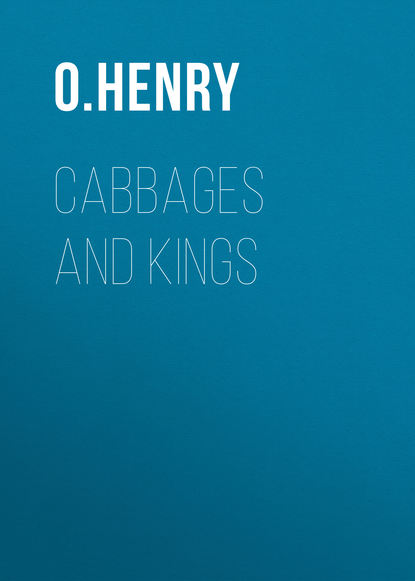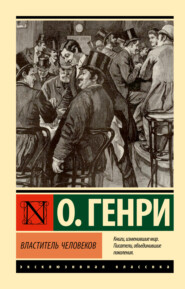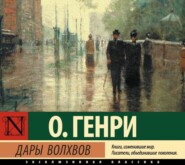По всем вопросам обращайтесь на: info@litportal.ru
(©) 2003-2025.
✖
Cabbages and Kings
Настройки чтения
Размер шрифта
Высота строк
Поля
"There is no need to continue your insults," she said, coldly. "I do not understand what you are saying, nor do I know what mad blunder you are making; but if the inspection of the contents of a gentleman's portmanteau will rid me of you, let us delay it no longer."
She passed quickly and noiselessly into the other room, and returned with the heavy leather valise, which she handed to the American with an air of patient contempt.
Goodwin set the valise quickly upon the table and began to unfasten the straps. The lady stood by, with an expression of infinite scorn and weariness upon her face.
The valise opened wide to a powerful, sidelong wrench. Goodwin dragged out two or three articles of clothing, exposing the bulk of its contents – package after package of tightly packed United States bank and treasury notes of large denomination. Reckoning from the high figures written upon the paper bands that bound them, the total must have come closely upon the hundred thousand mark.
Goodwin glanced swiftly at the woman, and saw, with surprise and a thrill of pleasure that he wondered at, that she had experienced an unmistakable shock. Her eyes grew wide, she gasped, and leaned heavily against the table. She had been ignorant, then, he inferred, that her companion had looted the government treasury. But why, he angrily asked himself, should he be so well pleased to think this wandering and unscrupulous singer not so black as report had painted her?
A noise in the other room startled them both. The door swung open, and a tall, elderly, dark complexioned man, recently shaven, hurried into the room.
All the pictures of President Miraflores represent him as the possessor of a luxuriant supply of dark and carefully tended whiskers; but the story of the barber, Estebán, had prepared Goodwin for the change.
The man stumbled in from the dark room, his eyes blinking at the lamplight, and heavy from sleep.
"What does this mean?" he demanded in excellent English, with a keen and perturbed look at the American – "robbery?"
"Very near it," answered Goodwin. "But I rather think I'm in time to prevent it. I represent the people to whom this money belongs, and I have come to convey it back to them." He thrust his hand into a pocket of his loose, linen coat.
The other man's hand went quickly behind him.
"Don't draw," called Goodwin, sharply; "I've got you covered from my pocket."
The lady stepped forward, and laid one hand upon the shoulder of her hesitating companion. She pointed to the table. "Tell me the truth – the truth," she said, in a low voice. "Whose money is that?"
The man did not answer. He gave a deep, long-drawn sigh, leaned and kissed her on the forehead, stepped back into the other room and closed the door.
Goodwin foresaw his purpose, and jumped for the door, but the report of the pistol echoed as his hand touched the knob. A heavy fall followed, and some one swept him aside and struggled into the room of the fallen man.
A desolation, thought Goodwin, greater than that derived from the loss of cavalier and gold must have been in the heart of the enchantress to have wrung from her, in that moment, the cry of one turning to the all-forgiving, all-comforting earthly consoler – to have made her call out from that bloody and dishonoured room – "Oh, mother, mother, mother!"
But there was an alarm outside. The barber, Estebán, at the sound of the shot, had raised his voice; and the shot itself had aroused half the town. A pattering of feet came up the street, and official orders rang out on the still air. Goodwin had a duty to perform. Circumstances had made him the custodian of his adopted country's treasure. Swiftly cramming the money into the valise, he closed it, leaned far out of the window and dropped it into a thick orange-tree in the little inclosure below.
They will tell you in Coralio, as they delight in telling the stranger, of the conclusion of that tragic flight. They will tell you how the upholders of the law came apace when the alarm was sounded – the Comandante in red slippers and a jacket like a head waiter's and girded sword, the soldiers with their interminable guns, followed by outnumbering officers struggling into their gold lace and epaulettes; the barefooted policemen (the only capables in the lot), and ruffled citizens of every hue and description.
They say that the countenance of the dead man was marred sadly by the effects of the shot; but he was identified as the fallen president by both Goodwin and the barber Estebán. On the next morning messages began to come over the mended telegraph wire; and the story of the flight from the capital was given out to the public. In San Mateo the revolutionary party had seized the sceptre of government, without opposition, and the vivas of the mercurial populace quickly effaced the interest belonging to the unfortunate Miraflores.
They will relate to you how the new government sifted the towns and raked the roads to find the valise containing Anchuria's surplus capital, which the president was known to have carried with him, but all in vain. In Coralio Señor Goodwin himself led the searching party which combed that town as carefully as a woman combs her hair; but the money was not found.
So they buried the dead man, without honours, back of the town near the little bridge that spans the mangrove swamp; and for a real a boy will show you his grave. They say that the old woman in whose hut the barber shaved the president placed the wooden slab at his head, and burned the inscription upon it with a hot iron.
You will hear also that Señor Goodwin, like a tower of strength, shielded Doña Isabel Guilbert through those subsequent distressful days; and that his scruples as to her past career (if he had any) vanished; and her adventuresome waywardness (if she had any) left her, and they were wedded and were happy.
The American built a home on a little foothill near the town. It is a conglomerate structure of native woods that, exported, would be worth a fortune, and of brick, palm, glass, bamboo and adobe. There is a paradise of nature about it; and something of the same sort within. The natives speak of its interior with hands uplifted in admiration. There are floors polished like mirrors and covered with hand-woven Indian rugs of silk fibre, tall ornaments and pictures, musical instruments and papered walls – "figure-it-to-yourself!" they exclaim.
But they cannot tell you in Coralio (as you shall learn) what became of the money that Frank Goodwin dropped into the orange-tree. But that shall come later; for the palms are fluttering in the breeze, bidding us to sport and gaiety.
V
CUPID'S EXILE NUMBER TWO
The United States of America, after looking over its stock of consular timber, selected Mr. John De Graffenreid Atwood, of Dalesburg, Alabama, for a successor to Willard Geddie, resigned.
Without prejudice to Mr. Atwood, it will have to be acknowledged that, in this instance, it was the man who sought the office. As with the self-banished Geddie, it was nothing less than the artful smiles of lovely woman that had driven Johnny Atwood to the desperate expedient of accepting office under a despised Federal Government so that he might go far, far away and never see again the false, fair face that had wrecked his young life. The consulship at Coralio seemed to offer a retreat sufficiently removed and romantic enough to inject the necessary drama into the pastoral scenes of Dalesburg life.
It was while playing the part of Cupid's exile that Johnny added his handiwork to the long list of casualties along the Spanish Main by his famous manipulation of the shoe market, and his unparalleled feat of elevating the most despised and useless weed in his own country from obscurity to be a valuable product in international commerce.
The trouble began, as trouble often begins instead of ending, with a romance. In Dalesburg there was a man named Elijah Hemstetter, who kept a general store. His family consisted of one daughter called Rosine, a name that atoned much for "Hemstetter." This young woman was possessed of plentiful attractions, so that the young men of the community were agitated in their bosoms. Among the more agitated was Johnny, the son of Judge Atwood, who lived in the big colonial mansion on the edge of Dalesburg.
It would seem that the desirable Rosine should have been pleased to return the affection of an Atwood, a name honoured all over the state long before and since the war. It does seem that she should have gladly consented to have been led into that stately but rather empty colonial mansion. But not so. There was a cloud on the horizon, a threatening, cumulus cloud, in the shape of a lively and shrewd young farmer in the neighbourhood who dared to enter the lists as a rival to the high-born Atwood.
One night Johnny propounded to Rosine a question that is considered of much importance by the young of the human species. The accessories were all there – moonlight, oleanders, magnolias, the mock-bird's song. Whether or no the shadow of Pinkney Dawson, the prosperous young farmer, came between them on that occasion is not known; but Rosine's answer was unfavourable. Mr. John De Graffenreid Atwood bowed till his hat touched the lawn grass, and went away with his head high, but with a sore wound in his pedigree and heart. A Hemstetter refuse an Atwood! Zounds!
Among other accidents of that year was a Democratic president. Judge Atwood was a warhorse of Democracy. Johnny persuaded him to set the wheels moving for some foreign appointment. He would go away – away. Perhaps in years to come Rosine would think how true, how faithful his love had been, and would drop a tear – maybe in the cream she would be skimming for Pink Dawson's breakfast.
The wheels of politics revolved; and Johnny was appointed consul to Coralio. Just before leaving he dropped in at Hemstetter's to say good-bye. There was a queer, pinkish look about Rosine's eyes; and had the two been alone, the United States might have had to cast about for another consul. But Pink Dawson was there, of course, talking about his 400-acre orchard, and the three-mile alfalfa tract, and the 200-acre pasture. So Johnny shook hands with Rosine as coolly as if he were only going to run up to Montgomery for a couple of days. They had the royal manner when they chose, those Atwoods.
"If you happen to strike anything in the way of a good investment down there, Johnny," said Pink Dawson, "just let me know, will you? I reckon I could lay my hands on a few extra thousands 'most any time for a profitable deal."
"Certainly, Pink," said Johnny, pleasantly. "If I strike anything of the sort I'll let you in with pleasure."
So Johnny went down to Mobile and took a fruit steamer for the coast of Anchuria.
When the new consul arrived in Coralio the strangeness of the scenes diverted him much. He was only twenty-two; and the grief of youth is not worn like a garment as it is by older men. It has its seasons when it reigns; and then it is unseated for a time by the assertion of the keen senses.
Billy Keogh and Johnny seemed to conceive a mutual friendship at once. Keogh took the new consul about town and presented him to the handful of Americans and the smaller number of French and Germans who made up the "foreign" contingent. And then, of course, he had to be more formally introduced to the native officials, and have his credentials transmitted through an interpreter.
There was something about the young Southerner that the sophisticated Keogh liked. His manner was simple almost to boyishness; but he possessed the cool carelessness of a man of far greater age and experience. Neither uniforms nor titles, red tape nor foreign languages, mountains nor sea weighed upon his spirits. He was heir to all the ages, an Atwood, of Dalesburg; and you might know every thought conceived in his bosom.
Geddie came down to the consulate to explain the duties and workings of the office. He and Keogh tried to interest the new consul in their description of the work that his government expected him to perform.
"It's all right," said Johnny from the hammock that he had set up as the official reclining place. "If anything turns up that has to be done I'll let you fellows do it. You can't expect a Democrat to work during his first term of holding office."
"You might look over these headings," suggested Geddie, "of the different lines of exports you will have to keep account of. The fruit is classified; and there are the valuable woods, coffee, rubber – "
"That last account sounds all right," interrupted Mr. Atwood. "Sounds as if it could be stretched. I want to buy a new flag, a monkey, a guitar and a barrel of pineapples. Will that rubber account stretch over 'em?"
"That's merely statistics," said Geddie, smiling. "The expense account is what you want. It is supposed to have a slight elasticity. The 'stationery' items are sometimes carelessly audited by the State Department."
"We're wasting our time," said Keogh. "This man was born to hold office. He penetrates to the root of the art at one step of his eagle eye. The true genius of government shows its hand in every word of his speech."
"I didn't take this job with any intention of working," explained Johnny, lazily. "I wanted to go somewhere in the world where they didn't talk about farms. There are none here, are there?"
"Not the kind you are acquainted with," answered the ex-consul. "There is no such art here as agriculture. There never was a plow or a reaper within the boundaries of Anchuria."
"This is the country for me," murmured the consul, and immediately he fell asleep.
The cheerful tintypist pursued his intimacy with Johnny in spite of open charges that he did so to obtain a preëmption on a seat in that coveted spot, the rear gallery of the consulate. But whether his designs were selfish or purely friendly, Keogh achieved that desirable privilege. Few were the nights on which the two could not be found reposing there in the sea breeze, with their heels on the railing, and the cigars and brandy conveniently near.

















